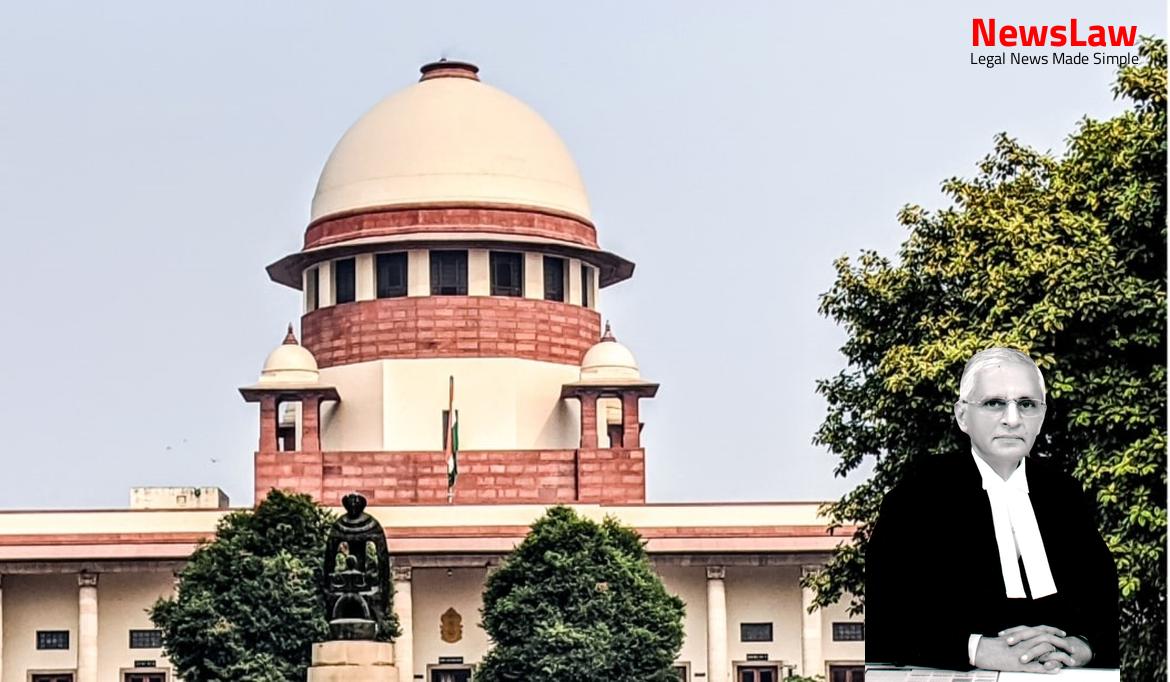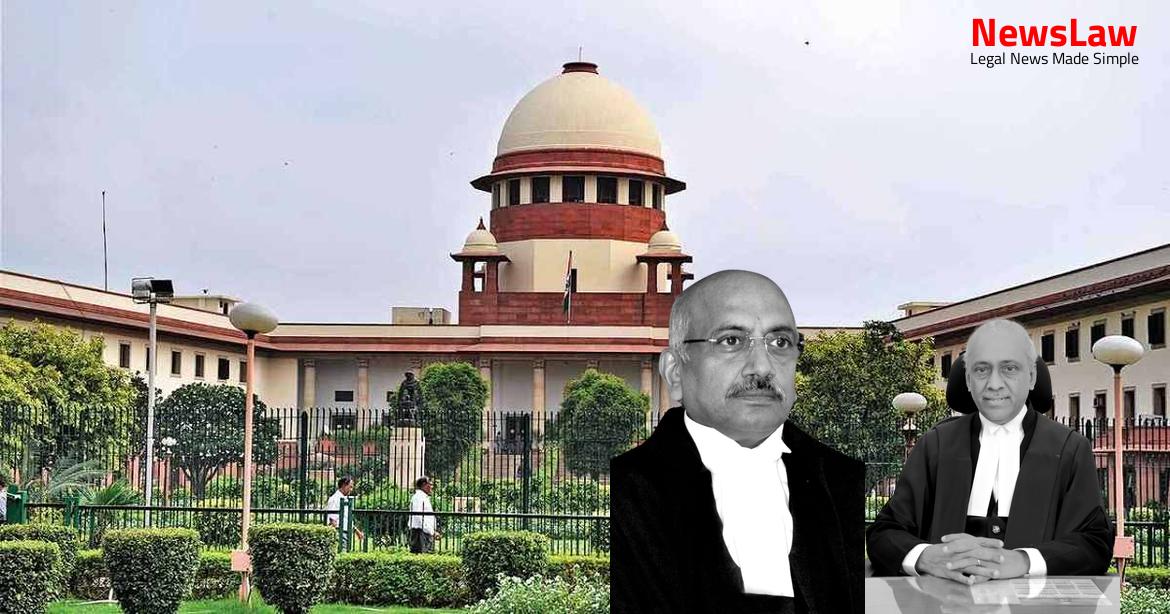Delve into the complex legal analysis conducted by the court regarding the disinvestment of government shareholding in a recent case. Discover the nuanced considerations and implications discussed in the judgment, shedding light on the intricacies of such transactions.
Facts
- The Confederation, a trade union, and three other petitioners challenge the disinvestment of residual shareholding in Hindustan Zinc Limited (HZL) by the Union Government.
- The petitioners argue that the residual shareholding ensures control over key decisions concerning HZL and its strategic mineral deposits of lead and zinc.
- The Union Government’s control is governed by sections of the Companies Act 2013.
- The petitioners seek two reliefs: a mandamus to refrain from disinvesting the residual shareholding without amending the Nationalisation Act 1976, and a direction for the CBI to file status reports periodically on its investigation.
- The CBI filed a closure report in March 2017 stating that no criminal case was warranted based on the preliminary enquiry.
- The filing of pleadings in the case has been completed.
- Writ petitions challenging the disinvestment of the shareholding of the Union Government in government companies dismissed by a three-judge Bench on 23 August 2006.
- Companies involved in the disinvestment were Engineers India Limited, National Fertilizers Limited, and Burn Standard Company Limited.
Also Read: Electoral Malpractices in Mayor Election
Arguments
- CBI conducted the preliminary enquiry not based on the complaint but on source information
- Failure to comply with Lalita Kumari decision
- Several CBI officers recommended registering a regular case
- Petitioner should be informed of the circumstances leading to closure of enquiry
- Requirement to furnish reasons for closing enquiry to complainant as per Lalita Kumari decision
- Challenging final report under Section 173 of CrPC not available when CBI decides not to register a regular case
- Allegations against the then Attorney General regarding opinion given should be disclosed to petitioner
- The petition challenging the disinvestment of the residual 29.54% shareholding of the Union Government is considered barred by the principles of res judicata due to the dismissal of a previous writ petition by Maton Mines Mazdoor Sangh in 2012.
- During privatization in 2002, a shareholders’ agreement was formed granting SOVL a call option to acquire shares in HZL, including the residual 29.54% shares.
- Since the disinvestment of 70.5% shares initially is not disputed, HZL is no longer considered a government company under the Nationalisation Act 1976.
- The White Paper on Disinvestment of Public Sector Enterprises from 31 July 2007 highlights the evolution of disinvestment policy through Union Finance Ministers’ Budget Speeches.
- The Union Government had started disinvestment of its equities in public sector corporations post the Industrial Policy Statement of 24 July 1991, selling minority shareholdings to financial institutions.
- There is a question regarding whether the Nationalisation Act 1976 imposes any restrictions on the sale of the remaining shareholding of the Union Government in HZL.
Also Read: Balancing Power and Transparency: Electoral Bonds Struck Down, Disclosure Mandated
Analysis
- Undertaking of Metal Corporation vested in Central Government as per Part D 34
- Central government empowered to direct the vesting of the Employee Stock Option Plan as per Section 9
- All assets, liabilities, and management of the undertaking vested in Central Government as per Section 4 of the Nationalisation Act 1976
- Central Government has the power to determine the terms of issuing Debentures convertible into shares
- Various provisions related to share capital reduction, buyback of shares, issuance of debentures convertible into shares, removal of auditors, appointment of directors, and restrictions on board powers outlined in different sections
- The Court analyzed the validity and implications of the disinvestment of Hindustan Zinc Limited (HZL) by the Union Government.
- The disinvestment process in 1991-92 and 2002 resulted in HZL ceasing to be a government company as its shareholding fell below 51 percent.
- The Court considered the challenge to the Union Government’s decision to sell its residual stake in HZL.
- Various irregularities in the disinvestment process, bidding, valuation, and the involvement of external agencies like CBI were scrutinized.
- The Court examined the legal provisions, previous decisions, and the impact of the Nationalisation Act 1976 on the disinvestment.
- An in-depth analysis of the CBI’s preliminary enquiry closure, objections, and recommendations regarding the valuation and sale process of HZL.
- The Court acknowledged the commercial aspect of the Union Government’s decision to disinvest its shares in HZL and emphasized the lack of challenge to the earlier disinvestments.
- The judgment highlighted the importance of upholding the shareholder rights of the Union Government in commercial decisions regarding the sale of its shares.
- Determining the impact of the disinvestment on HZL’s status as a government company, shareholder control, and financial implications.
- Shareholding of SOVL increased to 64.92% after the exercise of the first call option in 2002.
- Court observed that the divestment of shareholding in HPCL and BPCL required amending the statutes under which they were nationalized.
- No bar existed for the disinvestment leading to HZL ceasing to be a government company.
- CBI registered a preliminary enquiry in relation to the HZL disinvestment during 1997-2003.
- Court clarified conditions for directing CBI to conduct an investigation despite its decision to close preliminary enquiry.
- Union government proposed disinvestment of public sector company shares after policy upheld by the court.
- Court highlighted the conversion process of a preliminary inquiry into a regular case by CBI.
- Union Government’s capacity to disinvest its shareholding as a shareholder was not restrained by constitutional norms.
- Constitution Bench held that the notice requisitioning a meeting of a company by LIC was not challengeable.
- Trend of poorly pleaded public interest litigations filed to obtain instant dismissal highlighted.
- Contemporary reality of ‘ambush Public Interest Litigations’ and access to justice emphasized.
- Petition not barred by res judicata due to previous dismissal without adjudication on merits.
- Shareholding pattern in HZL presented, showing acquisitions by SOVL from the public and Union Government.
- Duty of police to register an FIR emphasized when information received discloses commission of a cognizable offence.
- Union Government’s decision to disinvest 29.54% of its residual shareholding in HZL is deemed permissible.
- SOVL stated it will not exercise its second call option under the Share Purchase Agreement.
- Residual shareholding divestment will occur in the open market following SEBI regulations to achieve the best price.
- Sufficient grounds exist for registering a regular case regarding the 26% disinvestment of HZL by the Union Government in 2002.
- CBI directed to register a regular case and proceed as per the law.
Also Read: Recall of Resolution Plan Approval: Legal Analysis
Decision
- The petition under Article 32 is partially allowed.
- Reports are to be submitted every quarter or as directed by the Court.
- Pending applications will be disposed of.
- The CBI is directed to register a regular case and provide status reports periodically.
Case Title: NATIONAL CONFEDERATION OF OFFICERS ASSOCIATION OF CENTRAL PUBLIC SECTOR ENTERPRISES Vs. UNION OF INDIA (2021 INSC 758)
Case Number: W.P.(C) No.-000229-000229 / 2014



